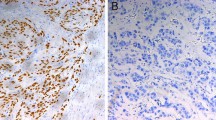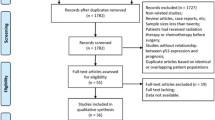Abstract
This study was performed to evaluate p53 overexpression as a predictor of the response to chemotherapy of patients with gastric cancer. The subjects comprised 20 patients with Stage IV gastric cancer and three with locally recurrent lesions, all of whom were treated with 5-fluorouracil (5-FU) plus cisplatin (CDDP) for 4 weeks. Of the total 23 patients there were 10 responders; 2 showing complete response (CR) and 8, partial response (PR). Specimens obtained by endoscopic biopsy were immunohistochemically stained using anti-p53 protein and bcl-2 protein antibody. Of the 10 responders, 7 demonstrated negative p53 staining, and of the 13 nonresponders, 11 demonstrated positive p53 staining (P=0.013). Tissue from 3 of the responders and 7 of the nonresponders that stained for bcl-2 were positive prior to chemotherapy; however, there was no association between bcl-2 staining and chemotherapeutic effect. In conclusion, immunohistochemical identification of p53 in pretreatment tissue may represent a useful predictor for chemotherapeutic outcome in patients with gastric cancer.
Similar content being viewed by others
References
Plukker JT, Mulder NH, Sleijfer DT, Grond J, Versheuren RCJ (1991) Chemotherapy and surgery for locally advanced cancer of the cardia and fundus: phase II study with methotrexate and 5-fluorouracil. Br J Surg 78:955–958
Preusser P, Wilke H, Achterrath W, Fink U, Lenaz L, Heinicke A (1989) Phase II study with the combination etoposide, doxorubicin, and cisplatin in advanced measurable gastric cancer. J Clin Oncol 7:1310–1317
Barry MA, Behnke CA, Eastman A (1990) Activation of programmed cell death (apoptosis) by cisplatin, other anticancer drugs, toxins and hyperthermia. Biochem Pharmacol 40:2353–2362
Lowe SW, Ruley HE, Jacks T, Housman DE (1993) p53-dependent apoptosis modulates the cytotoxicity of anticancer agents. Cell 74:957–967
Japanese Research Society for Gastric Cancer (1995) Japanese Classification of Gastric Carcinoma: 1st English edn. Kanehara, Tokyo
Lauwers GY, Scott GV, Karpeh MS (1995) Immunohistochemical evaluation of bcl-2 protein expression in gastric adenocarcinomas. Cancer 75:2209–2213
Van den Berg FM, Baas IO, Polak MM, Offerhaus GJA (1993) Detection of p53 overexpression in routinely paraffin-embedded tissue of human carcinomas using a novel target unmasking fluid. Am J Pathol 142:381–385
Baas IO, Mulder JWR, Offerhaus JA, Vogelstein B, Hamilton SR (1994) An evaluation of six antibodies for immunohistochemistry of mutant p53 gene product in archival colorectal neoplasma. J Pathol 172:5–12
Umekita Y, Kobayashi K, Saheki T, Yoshida H (1994) Nuclear accumulation of p53 protein correlates with mutation in the p53 gene on archival paraffin-embedded tissues of human breast cancer. Jpn J Cancer Res 85:825–830
Lowe SW, Bodis S, McClatchey A, Remington L, Ruley E, Fisher DE, Housman DE, Jacks T (1994) p53 status and the efficacy of cancer therapy in vivo. Science 266:807–810
Nabeya Y, Loganzo F Jr, Maslak P, Lai L, de Oliveira AR, Schwartz GK, Blundell ML, Altorki NK, Kelsen DP, Albino AP (1995) The mutational status of p53 protein in gastric and esophageal adenocarcinoma cell lines predicts sensitivity to chemotherapeutic agents. Int J Cancer 64:37–46
Pavletich NP, Chambers KA, Pabo CO (1993) The DNA-binding domain of p53 contains the four conserved regions and the major mutation hot spots. Genes Dev 7:2556–2564
Yin XM, Oltvai ZN, Korsmeyer SJ (1994) BH-1 and BH-2 domains of Bcl-2 are required for inhibition of apoptosis and heterodimerization with Bax. Nature 369:321–323
Author information
Authors and Affiliations
Rights and permissions
About this article
Cite this article
Nakata, B., Chung, K.HY., Ogawa, M. et al. p53 Protein overexpression as a predictor of the response to chemotherapy in gastric cancer. Surg Today 28, 595–598 (1998). https://doi.org/10.1007/s005950050190
Received:
Accepted:
Issue Date:
DOI: https://doi.org/10.1007/s005950050190




